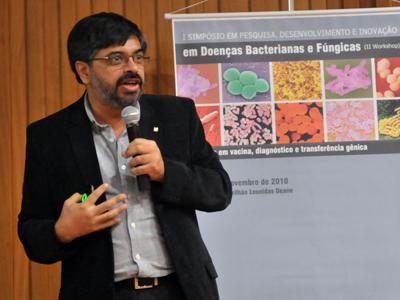Antibiotics that work

By Carlos F. Amábile-Cuevas
From the discovery of penicillin in 1928 to the introduction of the last of the main groups of antibiotics in the 1960s, humanity’s capacity to fight pathogenic bacteria has been transformative. But, over time, the number of antibiotics to which bacteria are susceptible has been dwindling, and some pathogens have become resistant to most or all existing drugs. As a result, once-treatable infections are becoming deadly again.
Already, antibiotic resistance is leading to an estimated 700,000 deaths per year, with financial costs reaching tens of billions of dollars. As antibiotic resistance continues to undermine our ability to treat cancers, transplant organs, and implant prosthesis, these figures will only rise.
Many factors have contributed to rising antibiotic resistance. Bacteria can reproduce and mutate rapidly, and they can establish something of a “genetic Internet” that enables certain pathogenic bacteria to “download” antibiotic-resistant genes. Moreover, most antibiotics are natural products of soil bacteria, in which antibiotic resistance can occur naturally. When human-made antibiotics were introduced on a massive scale, the bacteria with resistance became the most prevalent.
Today, humans release about 100,000 tons of antibiotics per year. If those antibiotics were being used properly and saving lives, a reasonable cost-benefit analysis might be possible. But about 70% of them are used to make farm animals to grow a bit faster. The other 30%, while used to treat people, are often prescribed incorrectly or needlessly. And, because a substantial share of the used drugs are released into the environment with wastewater and manure, bacterial communities in soils, waters, and wildlife are also exposed.
If this abuse of antibiotics does not end, we will soon find ourselves without drugs to treat bacterial infections effectively. But while some steps are being taken – a high-level United Nations meeting last September produced proposals for some international measures – they are far from adequate.
What is really needed is an immediate worldwide ban on the agricultural use of antibiotics. Moreover, guidelines for the clinical use of antibiotics, which the medical community now follows as closely as those concerning how to pick a necktie, must be reviewed and strongly enforced. These two measures alone – both of which could be enacted by governmental regulatory agencies – would reduce the use of antibiotics by nearly 80%, slowing the rise of antibiotic resistance substantially.
Of course, getting governments to implement such measures will not be easy, because they run counter to powerful economic interests, the most obvious being the pharmaceutical industry, which sells $40 billion worth of antibiotics each year. While Big Pharma has a strong interest in continued antibiotic abuse, it has little interest in developing new antibiotics to tackle drug-resistant bacteria. Drugs for chronic illnesses and cancer are better for their bottom line.
So Big Pharma is seeking “incentives” to pursue research and development of new antibiotics, such as extended patents or tax breaks; the alternative would be to charge astronomical prices for new drugs. But the benefits of such incentives for pharmaceutical companies would far exceed the cost of the actual R&D pursued; they would be instruments to funnel public funds into private hands – the very hands that caused the problem.
Beyond all of these carrots, however, societies should consider using some sticks. I propose an initiative that rates pharmaceutical companies according to their contribution to solving the antibiotic-resistance problem; those that do not contribute should be punished with fewer sales. I call it NANBU (No Antibiotics, No Business).
NANBU would grant points to companies with vigorous research programs or with new antibiotics in the development pipeline. Companies that do not manufacture or sell antibiotics for agricultural purposes, or that refuse to promote the use of antibiotics for diseases that do not require such drugs, would gain points as well. Those that engaged in the opposite behaviors – selling antibiotics as livestock “growth promoters” or actively encouraging physicians to prescribe the drugs – would lose points.
At first, virtually all drug companies would have negative scores. But, over time, the ratings could be adjusted, always according to scientifically sound advice from an independent group of experts. The ratings could then be used to guide drug-purchasing decisions.
For many kinds of relevant drugs, there are several options with similar efficacy and safety, produced by different companies. So clinicians could prescribe drugs mostly from highly rated companies, and avoid drugs from companies with low ratings. Patients could encourage such decision-making, and follow suit when purchasing over-the-counter drugs. Over time, antibiotics could become more profitable again, as engaged companies sell more of their other drugs and the need for costly incentives diminishes.
The key to NANBU’s success will be to ensure widespread understanding of the antibiotic-resistance threat and what is needed to combat it. This would give patients and doctors the impetus to regard NANBU ratings in making drug decisions, as well as to pressure their governments to take even stronger action. The use of a public awareness campaign to intensify pressure on governments to pursue necessary but difficult measures has worked before – for example, in advancing forest and fishery sustainability.
Public awareness was among the priorities highlighted at the UN meeting. To carry out that global effort, however, we need a new global institution that really is up to the task. NANBU, as an international NGO, would be able to cope with the transnational nature of most drug companies, while being protected from national-level lobbying or political pressure.
Antibiotic-resistant bacteria represent a global threat, and therefore cannot be addressed with national measures alone. The world must think and act together to preserve the huge gains to human health and wellbeing that antibiotics have enabled.
Copyright: Project Syndicate: Antibiotics That Work
---
Follow us on Twitter @AzerNewsAz
